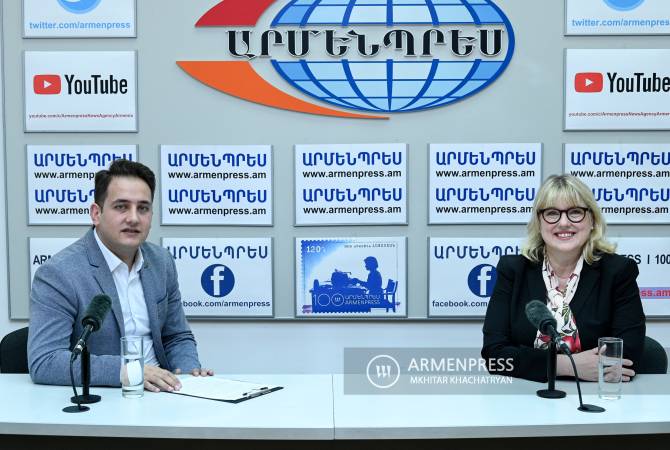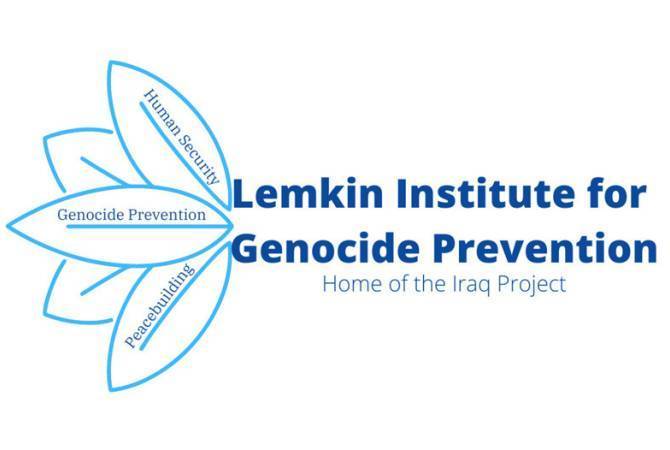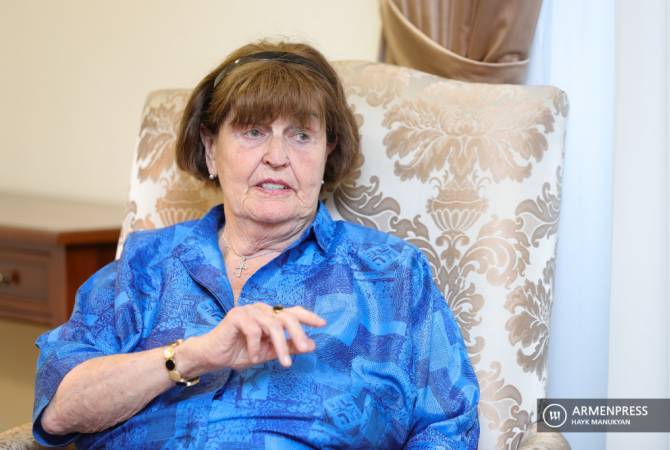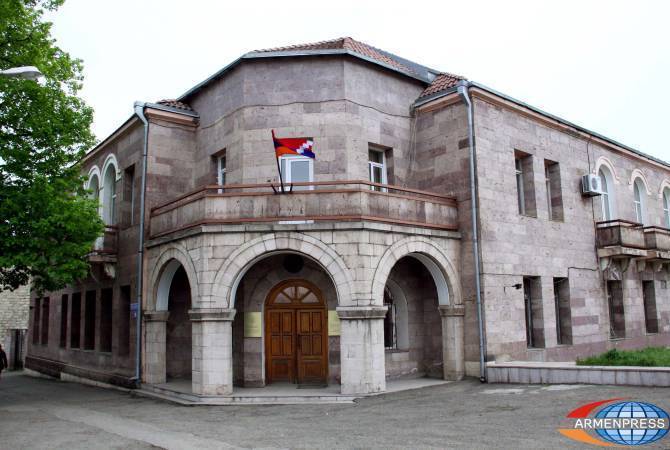Armenpress.am
Lemkin Institute Director urges to call Azerbaijan's actions in Karabakh as genocide and apply relevant convention
 15:28, 8 April 2024
15:28, 8 April 2024
YEREVAN, APRIL 8, ARMENPRESS. It is necessary for the international community to take clear steps against Azerbaijan, because dictators like its President Aliyev, who commits genocide, will not stop until someone forces them to stop.
Armenpress has interviewed the Executive Director of the Lemkin Institute for Genocide Prevention Dr. Elisa von Joeden-Forgey, covering the events which took place in Nagorno-Karabakh, the possibilities of the Armenian population to return to their homeland and other issues.
The interview is presented below:
- Doctor Elisa, the Lemkin Institute for Genocide Prevention has always warned and expressed its concerns about the events taking place in Nagorno-Karabakh last year, calling them preparations for genocide committed by Azerbaijan. Now when all your warnings have come true and Nagorno Karabakh is completely without Armenian population, what do you think the international community should have done to prevent the forced removal of ethnic Armenians from their homeland?
- There is so much that could have been done. Therefore, it is very frustrating. And it was frustrating and a little surprising for the Lemkin Institute that the international community did not do more beforehand. We called it a perfect storm for genocide prevention because of the way the situation was set up and because Azerbaijan has relations with the Western world, trade relations, economic relations, military relations, geostrategic relations, all sorts of diplomatic relations, so that they would have some leverage over Azerbaijan. And Azerbaijan also made it clear that the state had genocidal intent against Armenians and particularly against Armenians in Artsakh.
So everything seemed quite clear. And yet there was this terrible silence about what was happening. And there was never any pushback against Aliyev's threats and genocidal Armeniaphobia, which is very public. So it's not as if that was not known, but there was a terrible conspiracy of silence about it. Right, it wasn't secret. It was obvious. He announced it and it was obvious. So what could the world have done? They could have sanctioned Azerbaijan. They could have spoken vociferously against his genocidal Arminaphobia. They could have threatened at the UN level to isolate Azerbaijan. They could have used legal mechanisms as well to pull Azerbaijan back.
And especially they could have used backroom diplomacy more than I think they did, part of diplomacy that we don’t see. I don’t perceive that there was a great deal of pressure on Azerbaijan to shift its ways to change course or face serious, serious punishment. Aliyev knew that he was living in a space of impunity. And, you know, like other genocidal dictators, he was testing the waters piece by piece. There was the war, first of all, in 2020 and then, of course, he was taking Armenian territory in the Republic of Armenia after 2020, then there was the war, the aggressive war by Azerbaijan in September, 2022. And then there was the blockade (Nagorno-Karabakh) in December, 2022.
And then there was the construction of the Hakari checkpoint in April 2023 and just he was pushing and pushing and each time he pushed the international community continued with peace negotiations continuing to humor him and the consequence of that is always genocide when you are dealing with a genocidal dictator and they should have seen that.
- Do you see any possibility for Armenian population of Nagorno-Karabakh to be able to return to their homeland in case of clear and strong international guarantees? In your opinion, what can or should the international community do in this matter?
- It's very, very difficult once a population is displaced, for them to go home. If you look at the Rohingya, if you look at Darfuris, if you look at Christians and Yazidis and other minorities in Iraq, even though ISIS isn't still in power, They still have not been able to fully return to their ancestral homes. So it's very hard, but at the Lemkin Institute, we see the fact that the majority, the vast majority of Artsakhis are still alive. It's a blessing. One rarely has the opportunity to undo parts of a genocide and here we do and we should take advantage of that to get them home and secure. Because this is a 4.000 year old civilization. In the Western world, I am not sure there is much appreciation for what that means to have a 4.000-year-old continuous civilization, but that is something you cannot replace.
Once it's gone, it's gone. It takes 4.000 years to build, and the world absolutely needs that diversity. Therefore, we cannot squander these ancient communities anymore. People need to have a right to live in their ancestral homes. It is hard for Armenia because Armenia is in such a difficult geostrategic position. So what you need is the Western world to push it because what is going to happen if this is allowed, to just have this type of genocide can just occur without any pushback and total impunity and Azerbaijan profits from it. It profits from genocide. Then everyone is going to be using genocide in the 21st century. Anyone who wants to use it is going to use it and they will do it in this way. They will use this pattern because it worked for Azerbaijan.
They see it works. It works and they win. So this is the thing, like one can, states can have differences of opinion about certain things, even about territory. But when you have a population like the Artsakh’s, who have such a good case for self-determination, they have always been there. In my understanding of the history they have never been under direct foreign domination without some level of autonomy and local control. Throughout all the empires that have governed Artsakh they demanded independence and autonomy before the Republic of Armenia and the Republic of Azerbaijan were founded. They were an autonomous oblast in the Soviet Union. The minute the Soviet Union began to fall apart, Artsakh again demanded either independence or unity with Armenia.
This is a long-term claim that the Artsakhs are making, and the world needs to take those sorts of claims seriously. We are not in the colonial period anymore. Do you know where governments can simply move people away because they want the land. That's not how things work in a rule based order. If the Western world wants to live in a rule based order, they also have to find ways to impose that rule based order. And again, so the same things go now as they as the same things are relevant now as they were before September 19th, 2023, when Azerbaijan committed genocide.
And that is, Azerbaijan has to be brought to the negotiating table in a genuine fashion to work out some kind of solution with Artsakh’s Armenians, so they can live in their ancestral homes in peace and in security with self-governance and so I think the international community needs to press the issue of self-determination for the Artsakh people.
- After the deportation of Armenians in September 2023, Lemkin Institute also expressed its concern regarding the illegal arrests of the former leaders of Nagorno-Karabakh alarming of the dangers to their lives. In this regard, what steps should be taken by the world to release them and what methods can be undertaken?
- I think we need to change the language. So the international world, and this is particularly true of diplomats at the UN, for example, they need to change the language that is being used here. There is not enough pushback against Azerbaijan for the language it is using. So it is saying that these are legitimate prisoners because they are terrorists and separatists. This is very, very politicized language and it is simply not true.
Because of the reasons, I just outlined the history. The most of them are the democratically elected political figures in Artsakh that had, a really good democracy rating for this region from Freedom House, It had realy good freedom rating, much better. I think there was a 30 point difference, like Azerbaijan had nine. It's about democracy, yes, in a major way, because it's also about self-determination, national liberation, decolonization, all of those things. We have to change the language and let Azerbaijan know that these are not, these are hostages, these are captives, they are not somehow legitimate prisoners. And they're not really even accused of any realistic crimes, they are accused of wanting self-determination. What kind of a crime is that? All of this is a punishment for the fact that Armenians want sovereignty.
- Azerbaijani authorities continue to destroy and vandalize the Armenian historical heritage in Nagorno- Karabakh. Azerbaijani soldiers desecrate and annihilate both Armenian historical and cultural monuments even the Armenian cemeteries. The last action of vandalism was the destruction of the building of the National Assembly of Nagorno-Karabakh. Doctor Elisa, what kind of steps should the international community take for ending this violation and vandalism of Azerbaijan, because as we see this is a cultural genocide?
- Yes, absolutely, exactly. And I think the international community, you know, they use the term ethnic cleansing. And that works to a degree because it's a description of a process. But ethnic cleansing is just one form of genocide. Let's use the genocide term and let's activate the genocide convention. Some of the best evidence of genocide is this kind of cultural destruction, what's often called cultural genocide, but it's just genocide. Because what it shows is that the perpetrator was not just interested in moving people off of a territory.
The people are gone, so now why are they destroying these very symbolic buildings, churches, the National Parliament, I mean, that's a clear symbolic target. It's a way of cutting off the head of the Artsakh government, յust destroying the idea of Artsakh. I mean, all of this symbolic violence is just incredibly genocidal. You mentioned cemeteries. That's one of the most genocidal acts. Because what it seeks to do is to erase the historical presence and basically to kill memory, kill ancestry. It's an awful, awful crime. And the world needs to call it genocide.
The ICC could get involved. It's a difficult time for Armenia but a third country could also bring Azerbaijan in front of the ICJ. I would love to see something like that. Something major has to be done to stop Azerbaijan in its tracks because this isn't in the interest of the Azeri people, if I may say so, either. And Aliyev really relies on this Armenianphobia and these constant victories against the Armenian enemy for his own standing in Azerbaijan. His position, his power․ So this is just a terrible situation. I think Armenia is doing its best to deal with that. But I think the Western world needs to understand that genocidal dictators like Aliyev don't stop unless someone makes them stop.
- Taking into account the simple fact that genocides, in general, are carried out by states and their leaders, and at the same time considering the circumstance of existence of the imperative principle which does not allow to interfere in the internal affairs of states, how can we prevent genocides or hold accountable their perpetrators for their crimes and what tools do we have in this case?
- I think responsibility to protect comes into play here. If Azerbaijan is suggesting that Artsakhs were members of Azerbaijan somehow, so if they are going to suggest that, then they did a terrible, they're doing a terrible job, right, of protecting their own citizens. And that's the responsibility to protect external powers come into play when a state has demonstrated very clearly. We are in a very difficult time internationally. The world is changing very quickly. But I do think we need to keep using that language. And Azerbaijan doesn't serve its own citizens that well. So highlighting Azerbaijan's own human rights record, which isn't great, would also be helpful.
The problem in the West is that there is just this conspiracy of silence around Azerbaijan. They do not speak openly about Azerbaijan. If some other state that had less strategic importance to the West, had a leader that was saying the sorts of things that that Aliyev says or that the parliament says that “Armenians are the cancer of Europe”, there would be outrage in the international media and in international diplomatic circles. But Azerbaijan has a special status, unfortunately, It seems․ I think that has to end because we're not going to have peace in this region. It's too volatile with Azerbaijan acting the way it is. Aliyev will recognize that it's in his best interest to “shift gears” and to pursue a different sort of foreign policy towards Armenia, one that is based in equal sovereignty, respect for borders, right, and respect for the self-determination rights of the Artsakh people.
Davit Mamyan
https://armenpress.a...j3WMTC5o4-4HnNl
 11:21, 4 January 2023
11:21, 4 January 2023





















![Tsitsernakaberd genocide memorial [ History ] - last post by MosJan](http://hyeforum.com/uploads/profile/photo-thumb-7.jpg?_r=1179781278)



